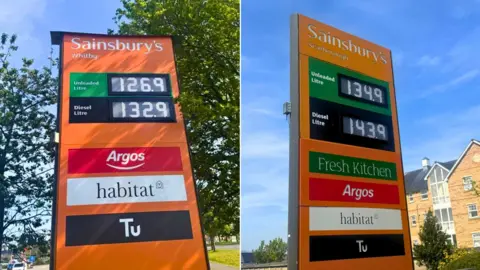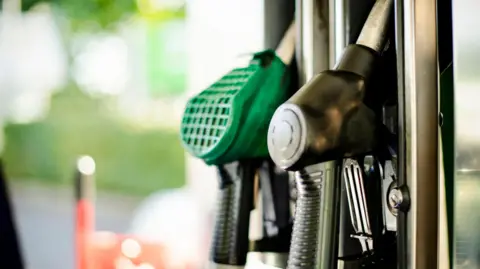Why is fuel in my town 10p more than the areas next door?
 BBC/ Emily Johnson
BBC/ Emily JohnsonFuel prices can be affected by a variety of factors from global conflicts to the cost of a barrel of crude oil, but in parts of North Yorkshire a 30-minute drive can see the cost of a litre drop by up to 11p.
Now motorists in Scarborough, who say they are routinely paying more than those in nearby Whitby, Malton and Pickering, have backed calls for retailers in the town to bring their prices in line with the rest of the county.
Scarborough-based driving instructor Nigel Brown says he can cover about 3,000 miles (4,800km) each month and spend more than £100 a week on petrol.
But he says he rarely stops at petrol stations in the town due to the cost.
Earlier this week at the Sainsbury's petrol station in Scarborough a litre of unleaded was priced at 134.9p and a litre of diesel was 143.9p.
Yet, less than 20miles (32km) away at the same supermarket's forecourt in Whitby unleaded was selling for 126.9p a litre and diesel 132.9p.
Similarly other retailers prices outside of Scarborough are also notably cheaper.
 BBC/Emily Johnson
BBC/Emily Johnson"I work all around, in Malton, Driffield and Pickering, and it's at least 10p dearer in Scarborough than all of those places," the My Four Wheels driving instructor says.
"I tend to save mine and get it further afield, especially when I'm in Malton doing lessons.
"I know it's not a massive difference, but the extra miles you get makes all the difference.
"If they can bring all the petrol prices in line, there's no reason why they can't have Scarborough the same as Bridlington and Whitby, they're all interlinked.
"Whitby is also a tourist place but their prices are a lot lower."
He says he thinks the higher price also impacts on the cost of driving lessons in the area, which is about £35 an hour.
 BBC/ Emily Johnson
BBC/ Emily JohnsonFellow driving instructors Iain and Lynne Hall who operate Hall Driving School in Scarborough say they had noticed fuel costs were steeper in the town after visiting other North Yorkshire villages and making a trip to Liverpool.
"I don't understand why one coastal town would be more expensive than another coastal town, it seems bizarre," Mrs Hall says.
"I haven't a clue why it is, I know they all compete with each other, but I don't know how they set the prices," Mr Hall adds.
The couple recently decided to make the switch to electric cars, citing fuel costs as part of the reason.
"We didn't realise until we'd gone electric how much difference there would be," Mr Hall says.
"Regarding regional variations with fuel, there doesn't seem to be a variation with electric.
"It doesn't matter where we are in the country, the price stays the same whether we charge here or charge up the road."
As they are retired and only work part-time, each estimate they drive about 200 miles (320km) a week.
"I worked out recently how much we'd saved based on petrol prices and it's about £2,000 a year in fuel," Mr Hall adds.
"It's a huge amount, it's made a big difference."
 Getty Images
Getty ImagesA Sainsburys spokesperson said the supermarket prices fuel locally and always aims to be competitive.
However, neither Sainsburys nor the Petrol Retailers Association were able to explain the reason for the gap in prices in North Yorkshire.
Simon Williams, head of policy at the RAC, said that despite asking this question for years, it was still veiled in mystery.
"Sometimes it can be because an area is more affluent than another area but sometimes it can be just that there isn't a presence of a lower cost retailer," he said.
"Everyone pays the same wholesale price, albeit at a slightly different time, depending on when they're buying.
"The supermarkets buy the most fuel because they sell the most fuel, so they have the ability to reflect wholesale changes up or down far more quickly than small independent retailers who tend only to buy new stock every couple of weeks."
According to the RAC, the Competition and Markets Authority found that major retailers overcharged drivers by £900m in 2022 and in 2023, while across the board retailers were deemed to have overcharged by £1.6bn.
The RAC has called for all retailers to lower their pump prices to reflect wholesale prices.
Meanwhile, Luke Bodset from the AA said the problem was a "long-running gripe" with motorists known in the industry as the "pump-price postcode lottery".
"The focus has been primarily on supermarkets: why, when eggs, bread, etc are the same price wherever you go, is road fuel not treated similarly?" he said.
"The 'reasons' given by the retailers are [that] pump prices are set locally – forecourts within an area will compare their prices with those of nearby rivals and set them accordingly.
"And so, unless one forecourt budges on price, the others don't see a need to move."
He said that competitive fuel stations were hard to find unless you live locally to them, but hoped that would change with a new government scheme.
Expected to come in early next year, the fuel finder project will require every forecourt to register its pump prices with a central database so people can compare prices.
"It is expected that the transparency will not only direct drivers to the cheap fuel stations, without having to come across them by chance, but also spur competition," Mr Bodset said.
"Those retailers who keep their prices high will see customers drawn away to the cheaper ones and be pressured to bring down theirs in turn."
Listen to highlights from North Yorkshire on BBC Sounds, catch up with the latest episode of Look North.
